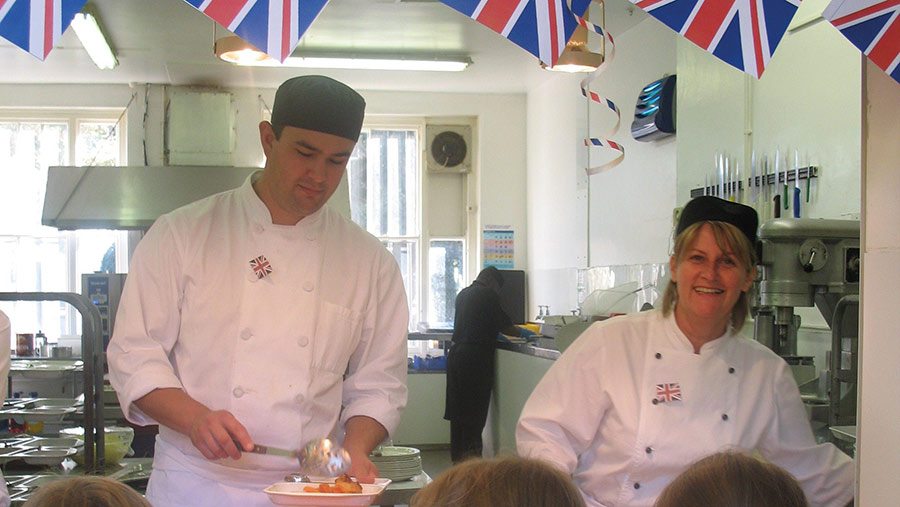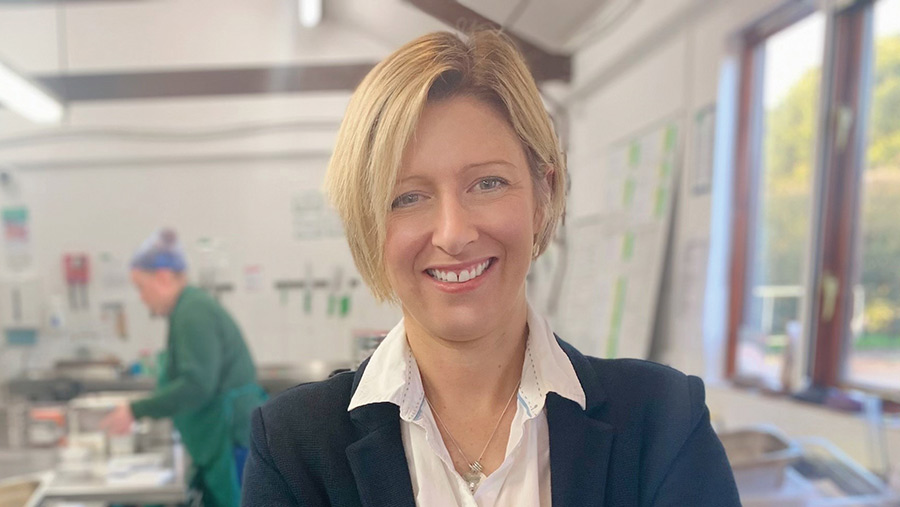Can supplying the public sector work for farmers?
 © LBF
© LBF One of the advantages of leaving the EU, it has been claimed, is the opportunity it presents to increase the amount of home-produced, British food used in the public sector.
Previously, public procurement was bound up in complex EU regulation that restricted the ability of national governments to show any favouritism towards their own food and farming industries.
But, post-Brexit, the government and local authorities now have an opportunity to change all that.
See also: Encourage public sector to buy more British food, say MPs
Clearly it is early days yet, but campaign group Love British Food (LBF) is pushing hard to try and increase the use of British farm produce by schools, hospitals, prisons and other public institutions.
“It is the best way to put quality, nutritional food on the plates of the elderly, the young and the sick, while providing the robust supply chain the food-service sector needs,” says LBF founder Alexia Robinson.
Barriers
Many farmers think that the main barrier to supplying the public sector is price. But this is not necessarily true, Ms Robinson believes.
The bigger barrier is the procurement contracts themselves, which can be intimidating.
“The contracts tend to demand consistent supply and reliable distribution to cover the whole annual requirement for a range of products over a potentially large area,” explains Ms Robinson.
“An independent farmer may have the perfect product and even be able to outbid national suppliers on price, but they are less likely to be able to support the volumes and distribution service required.”
This is where working together can come in, and LBF is in the process of assembling a team of eight farmers on a pilot basis to work directly with the public sector, tracking their progress to prove what can be achieved.
“Where there is a will, there is a way,” says Ms Robinson. “As Love British Food sees again and again, there are increasing numbers of public sector caterers who have been successful with local suppliers by taking a more flexible approach.”
Local supply chains
The challenges presented by the ongoing Covid-19 pandemic and the uncertainties of Brexit have raised the importance of robust, local supply chains, she adds.
As well as speed of delivery, shorter supply chains provide greater transparency, more control over food standards, and the ability to respond in times of crisis.
Local sourcing also provides the public sector with an opportunity to financially support the communities they serve.
These points have been emphasised in a letter sent from LBF to prime minister Boris Johnson.
It sets out one simple, but ambitious target for government – to spend 85% of the current public sector budget for procuring food and catering services with local British businesses and producers.
“Public procurement tenders must encourage British suppliers to participate, and institutions should support these suppliers through the complicated tender process,” the letter says. “We need education, action and sufficient central support to make this possible.”
How to get involved:
- To search for government contract opportunities, visit www.gov.uk/contracts-finder
- For higher-value contracts (above £118,000), visit www.gov.uk/find-tender
- For NHS opportunities, email suppliers@supplychain.nhs.uk
- Alternatively, contact your local hospital, school, university or care home group direct
- In Scotland, contact Scotland Excel, which manages tenders and contracts centrally
- Visit Love British Food’s public procurement hub for research findings and case studies
Efra committee report
Similar pressure is being applied by the cross-party Environment, Food and Rural Affairs (Efra) committee. Its recent report into public sector procurement of food expressed disappointment that government is not doing more to promote buying British in public institutions.
“Buying British does not have to be more expensive,” says committee chairman Neil Parish. “At the same time, we can support local, seasonally produced food, which is often healthier for the consumer, has lower food miles, and chimes with the government’s own net-zero and future farming ambitions too.”
In particular, the Efra report suggests that government buying standards for food be urgently updated and made mandatory, as a means of encouraging purchasers to seek out high-quality, seasonal produce that meets UK regulatory standards.
“Under the Agriculture Act 2020, the government is providing financial support for farmers who can demonstrate that they are producing food in ways that benefit the environment, enhance animal welfare and provide other public goods,” it says.
“It is therefore sensible to expect that the public sector provides a market for their produce.”
Case study: Vicky Howe, The Farm Kitchen, Lincolnshire

© Vicky Howe
A simple desire to “make a difference”, combined with a passion for food and farming, was the driver that persuaded Vicky Howe to set up The Farm Kitchen on her husband Will’s family farm near Sleaford in Lincolnshire.
“It was in the early 2000s, when Jamie Oliver was pushing his campaign for healthier school meals, that I saw the opportunity,” she recalls. “Lincolnshire had taken kitchens out of most schools to make room for IT suites, so schoolchildren in the county were not getting a hot meal every day.”
Since winning the first school contract in 2006, the business has grown steadily, and now supplies 4,500 meals a day to 55 schools in Lincolnshire, Rutland and Cambridgeshire.
It employs 48 staff, with 80% of the meals prepared in the main kitchen on the farm, though use is also made of smaller kitchens in three of the schools it services.
“Everything is cooked fresh and our ingredients are sourced locally, as well as seasonally,” says Ms Howe. “Our meat, for example, comes from a butcher in Sleaford and is all quality assured and British. Our brassicas and cabbages we collect from a local farm, while potatoes and carrots are supplied by Pilgrim Foods, which is supplied by local farmers.”
Work starts at 6.00am preparing the meals, and these are distributed to the schools by mid-morning in The Farm Kitchen’s own vans. The drivers then pick up all the dirty dishes in the afternoon, and return to base for washing-up.
Ms Howe says there has been tremendous buy-in from the schools she has direct contracts with, with staff and pupils showing real interest in how the food is produced and where it comes from.
While clearly motivated by a desire to share knowledge and influence future shoppers, Ms Howe is clear that The Farm Kitchen is a business – and one that turns a profit.
She also sees plenty of scope for other farmers to get in on supplying public bodies, given a bit of drive and initiative.
“It can be done, though it is essential to do the research,” she says. “You have to establish how procurement operates within your county, how it varies between schools, hospitals and prisons, and know who the key decision-makers are and what accreditations and certifications will be needed.”
Case study: Royal Blackburn Hospital, Lancashire
With over 1,200 beds across five hospitals, keeping patients and staff fed healthily is quite a challenge for East Lancashire Hospitals NHS Trust facilities manager Tim Radcliffe.
Just one of the hospitals – the Royal Blackburn – requires over 25,000 meals a week, and Mr Radcliffe is determined that as many of those as possible should contain local, British ingredients.
“Over 90% of these meals are cooked fresh in the hospital, and in our staff restaurant we have a map to show where it all comes from,” he says.
The hospital is Soil Association Food For Life accredited, which requires that all farmed meat is Red Tractor assured, all eggs are free range and all fish is sustainably caught.
“The more local it is, the better,” says Mr Radcliffe. “For example, all our eggs are from Chorley, our carrots, mushrooms and potatoes are from Ormskirk and our lettuce is from Southport – all in Lancashire.
“Apart from that, our lamb comes from Ruthin in Denbighshire, our beef is from Thirsk in Yorkshire, our pork is from Chesterfield in Derbyshire and our chicken is from Whitchurch in Shropshire.”
The hospital also takes wild venison from the Forestry Commission and is soon to add wild boar to its menu.
According to Mr Radcliffe, public institutions should be putting something back into the community they serve, and buying locally ticks that box.
But the Covid pandemic has also shown a strategic advantage to having shorter supply chains.
“Last April (2020) our main national supplier of groceries said they could not guarantee our supplies, so we turned to smaller, local suppliers who gave us the service we needed.”
He adds that it is not all about price, but it is about value. “Yes, I have to work within budgets, but buying a whole joint of meat, cutting it up and cooking it on site means I can get better quality, have less waste and fewer food miles.”
While the Trust does not deal directly with farmers, Mr Radcliffe says this is a logical extension of the policy he currently adopts and is something he wants to develop.
